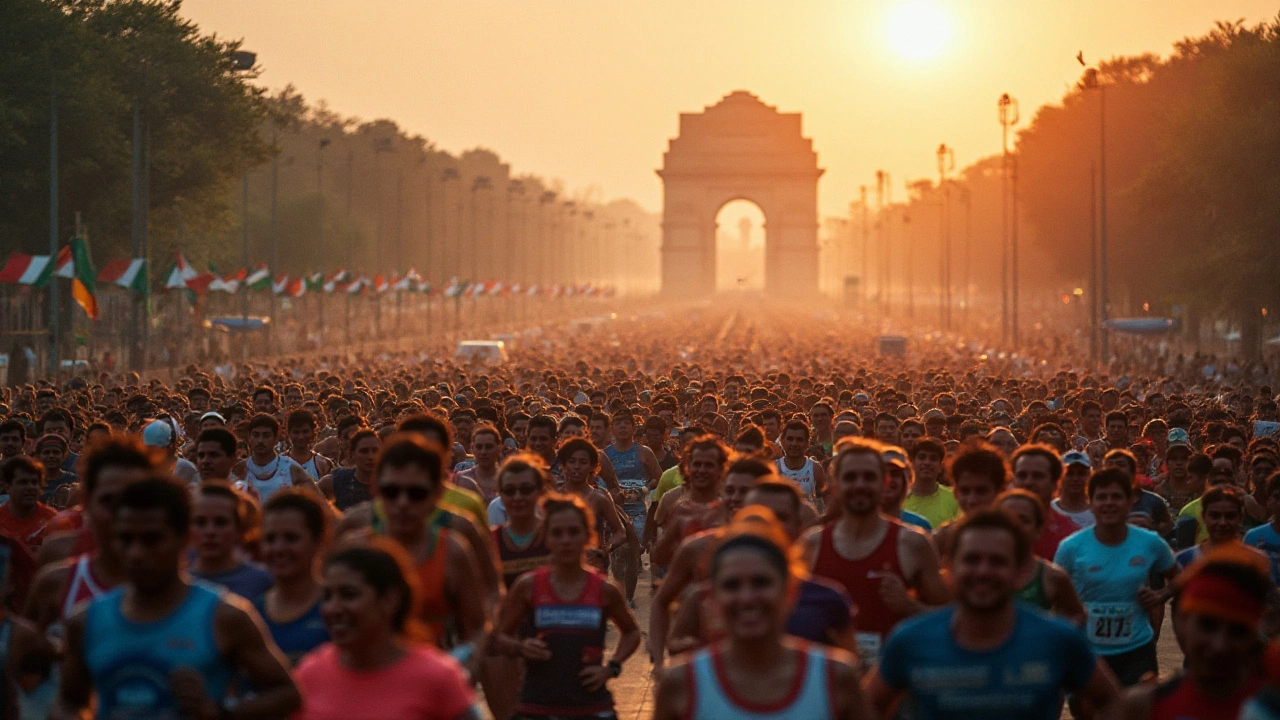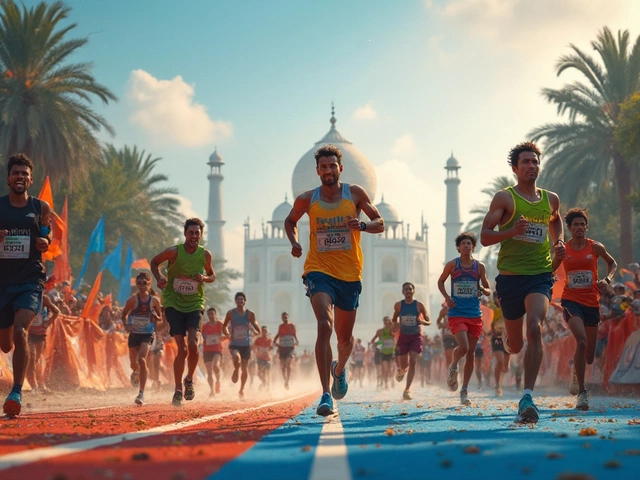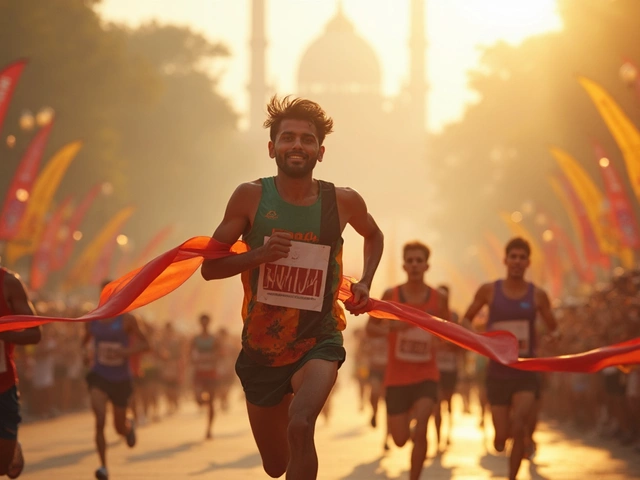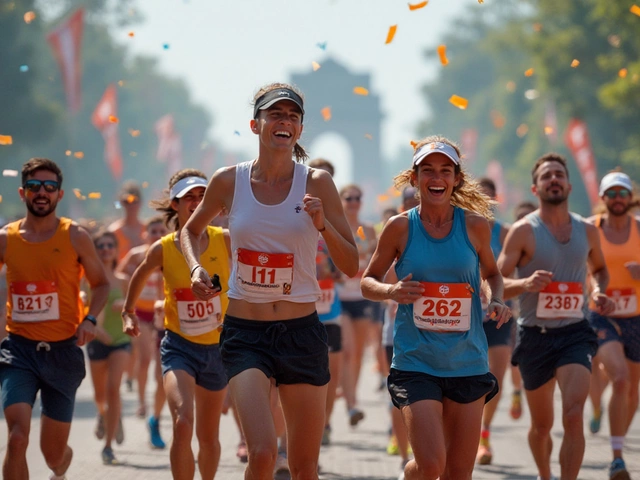Running a marathon is a journey that encompasses both physical endurance and mental determination. While many runners embark on the 26.2-mile quest, understanding the average time it takes to finish is not straightforward. Participants range from elite athletes to first-time marathoners, each with unique speeds and ambitions.
Worldwide, the average marathon time is roughly between four and five hours, but this figure is shaped by numerous elements. Personal fitness, training regimes, weather on the marathon day, and whether the course is uphill or flat can largely affect one's pace. As such, achieving a specific marathon time requires more than just physical readiness; it entails strategic preparation and knowing how to manage the unexpected.
- Unraveling Average Marathon Times
- Factors Influencing Marathon Completion
- Training Techniques for a Faster Marathon
- Psychological Prep: The Runner's Mindset
- Tips for Race Day Success
Unraveling Average Marathon Times
The notion of an "average marathon time" is an intriguing topic for both novice and seasoned runners. Typically, the global average marathon time hovers between four and five hours. The reasons contributing to this average are as diverse as the marathon runners themselves. For instance, experienced racers, often those who have been training for years, tend to complete marathons faster, often clocking in under the three-hour mark. Conversely, for beginners who may be tackling the 26.2 miles as a bucket-list item or fundraising challenge, completion could stretch closer to six hours or more.
Regional factors also play a crucial role in these averages. In countries where running culture thrives, like in Kenya or Ethiopia, marathon times have drastically different profiles compared to countries where the sport is less mainstream. A 2022 survey indicated that the average time for men was about 4 hours and 11 minutes, while women averaged slightly slower at 4 hours and 42 minutes. These statistics are informed by a variety of factors, including physiology, training accessibility, and cultural importance placed on distance running.
"To improve is to change; to be perfect is to change often." This quote by Winston Churchill could not be more relevant in the context of marathon running, where persistent effort and adaptation are key to improving one's personal marathon time.Understanding personal baselines and tracking progress are essentials for any runner aiming to cut down their marathon times. Many use technology tools, such as GPS watches and running apps, that provide insights regarding pace and heart-rate analytics. These data-driven approaches allow runners to tweak their training regimens effectively, ensuring they inch closer to their personal best.
The Role of Marathon Courses
The marathon course itself dramatically affects finishing times. City marathons across the globe offer remarkably varied topography. From the flat, sea-level roads of Berlin—famed for its record-breaking speeds—to New York City's challenging elevation changes, the marathon setting can significantly dictate runners' outcomes. Often, inexperienced runners overlook the marathon's geographical challenges, leading to unexpected hurdles on race day. It's no wonder seasoned athletes rigorously study course maps and profiles to adapt their strategies accordingly.
The Influence of Weather Conditions
Weather is another unpredictable factor. A marathon experienced under cool, overcast skies is markedly different from one held in the blistering summer sun, where high temperatures can drain energy levels and lead to dehydration. Studies have shown that optimal marathon running occurs between temperatures of 50-60°F (10-15°C), as cooler conditions help maintain body temperature and improve performance. Alas, weather remains one of those elements out of a runner's control, demanding adaptability and mental resilience.
| Region | Average Time (Men) | Average Time (Women) |
|---|---|---|
| United States | 4:22:07 | 4:48:45 |
| United Kingdom | 4:30:00 | 4:53:00 |
| Japan | 4:04:00 | 4:32:00 |
Ultimately, cracking the code of marathon completion times involves a blend of art and science. It's a journey of self-improvement where each stride offers its own lesson. As you lace up for your next race, remember that the average marathon time serves as a broad gauge. Your personal narrative will be defined by your own dedication, strategy, and unique circumstances on race day.
Factors Influencing Marathon Completion
Completing a marathon time is akin to solving a complex puzzle; various pieces hinge together to reveal the final picture of how long a runner might take. The journey from start to finish is affected by myriad factors, each contributing uniquely to the overall outcome. Among them, physical preparedness often sits at the forefront. It involves building a robust cardiovascular system, forged by weeks and months of marathon training. Specific training regimens impact how well runners manage both flatter terrains and challenging inclines, ultimately affecting the pace they maintain throughout the race.
Weather conditions on race day can also throw unforeseen challenges. A sunny day might seem inviting, yet the heat can drain stamina far quicker than one anticipates, while a windy or rainy day can introduce resistance that saps energy. Many seasoned runners take past weather into account when strategizing their approach, ensuring their clothing and hydration are optimized for whatever Mother Nature throws at them. Meanwhile, dietary choices leading up to the race can't be underestimated, as they provide the critical fuel needed for the journey. Carbohydrate loading, a popular practice among runners, helps maximize the glycogen stores muscles utilize over the long haul.
Experience often plays a crucial role. First-timers may face the daunting task of pacing themselves without succumbing to the adrenaline rush at the start. Without the tempered patience seasoned by previous marathons, there's a risk of hitting 'the wall' too soon. This phenomenon, where the body depletes its immediate energy reserves, can drastically slow down performance. Seasoned runners, conversely, deploy tactics learned from past races, such as run-walk strategies, to conserve energy for the full distance. Besides physicality, mental resilience is prominently influential. Cultivating a mindset that perseveres through fatigue, discomfort, and monotony relies heavily on building mental toughness alongside physical training.
Average marathon pace is another integral factor, evolving from a careful balance of speed work and endurance runs in training. It's not just about running longer but also learning to maintain a consistent speed amidst fatigue. Yet, the community spirit often seen in marathons can spur participants to maintain or even push their pace, with cheers from the crowd providing a boost and shared commiseration among fellow runners lending support when the going gets tough. As renowned coach Hal Higdon once quoted,
"The marathon never ceases to be a race of mystery for the competitors: how fast or how slow will it be today?"This encapsulates the unpredictability each runner confronts, as well as the importance of adapting to one's unique set of circumstances on race day.
| Influencing Factor | Impact on Marathon Completion |
|---|---|
| Physical Preparedness | Dictates stamina and pace sustainability |
| Weather Conditions | Can hinder or aid performance based on temperature and wind |
| Mental Resilience | Enables overcoming of physical and psychological barriers |
| Nutritional Strategy | Ensures energy supply is adequate throughout the race |
| Experience Level | Influences pace strategy and energy conservation techniques |

Training Techniques for a Faster Marathon
Embarking on the journey to a faster marathon time requires dedication and a strategic approach to training that goes beyond just putting in the miles. To truly shave minutes off your marathon time, it's essential to incorporate a variety of training techniques that target different aspects of athletic performance. One effective approach is incorporating interval training into your routine. Interval workouts, which consist of short bursts of speed followed by rest, can significantly enhance cardiovascular capacity and increase your speed. By pushing your limits in short, controlled settings, your body becomes accustomed to functioning at higher intensities, ultimately improving your average marathon pace.
Building endurance is equally crucial when aiming for a faster marathon. Long runs are a staple in marathon training, but focusing on progressive overload—gradually increasing the distance or the difficulty of your runs—can lead to better adaptation and stronger performance. Including tempo runs, where you maintain a steady, challenging pace, helps improve your lactate threshold. This means you'll be able to run faster over longer distances without as much fatigue. It's important to listen to your body during these sessions and ensure you're not overtraining, as rest and recovery are key elements of a successful training plan.
Strength training should not be overlooked when it comes to faster marathon preparation. Many runners fail to appreciate the role of a well-rounded strength training program in mitigating the risk of injury and boosting performance. Focus on exercises that build leg strength, like squats and lunges, as well as core routines that promote overall stability and better running economy. Cross-training in activities such as cycling or swimming can also provide cardiovascular benefits while giving your running muscles a break.
Nutrition plays a fundamental role in achieving a faster marathon time. Consuming a balanced diet rich in carbohydrates, proteins, and fats ensures that your body has the necessary fuel to perform and to recover post training. Hydration should also be a constant priority. The right combination of fluids and electrolytes helps to maintain endurance and imperative bodily functions during long runs. Prospective marathon runners would do well to experiment with different nutrition strategies during training to find what works best for them in race conditions.
Consistency is the backbone of any effective marathon training plan. Establishing a routine that includes a mix of long runs, speed work, strength training, and rest days is essential. It's often beneficial to follow a structured training plan that gradually increases in intensity and mileage, typically over 12 to 20 weeks leading up to race day. Adhering to the plan minimizes the risk of burnout and overtraining, allowing for sustained progress and adaptation. As motivational speaker Zig Ziglar eloquently said, "Success occurs when opportunity meets preparation." Preparedness through consistent training can indeed create the opportunity for success on marathon day.
Equally as important as physical preparation is the mental strategy employed both in training and on race day. Developing mental resilience through visualization and goal setting can provide the necessary motivation during tough parts of a race. Many elite runners use visualization techniques, picturing themselves reaching their goals, to stay focused and positive. Running a marathon isn't just a test of physical strength but also a testament to one’s mental toughness. Incorporating mindfulness practices, such as meditation and breathing exercises, can help maintain focus and reduce stress.
Psychological Prep: The Runner's Mindset
The marathon is as much a mental battle as it is a physical feat, requiring what some call a "runner's mindset." This mindset is crucial for crossing that finish line regardless of whether you're aiming for a record-breaking marathon time or simply aiming to complete the race. Believe it or not, the mind can be your greatest ally or your worst enemy when muscles begin to fatigue. Visualization techniques are valuable tools that many athletes rely on. Picturing each phase of the race from start to finish imbues a sense of familiar confidence. When mental hurdles arise, having rehearsed these moments in your mind helps in maintaining composure and focus.
Emotional resilience is vital as well. Let's face it: the journey from the start to the finish line isn’t just physically exhausting; it's an emotional rollercoaster. Training your mind to withstand moments when self-doubt creeps in is essential. According to sports psychologist Dr. Leah Lagos, "Managing anxiety and self-doubt requires a focus on the process rather than the outcome. Use the rhythm of your breath to anchor yourself in the moment; it can be the difference between despair and determination." Embracing mantras, like repeating a powerful phrase, can fortify one's mental strength. This repetition acts as a reminder of your race readiness and hard-earned preparation.
Believe it or not, pre-marathon nerves can be channeled into positive energy. This adrenaline rush often manifests as excitement and can enhance performance if harnessed correctly. Practicing mindfulness can aid in transforming anxious energy into enthusiasm. Techniques such as body scanning—where you mentally acknowledge parts of your body, helping center your thoughts and relax muscles—are beneficial. Keeping a positive mindset and focusing on each step, rather than worrying about the distance remaining, is another strategy often employed.
Understanding the power of support networks plays a role in preparing the runner's mindset. Fellow runners, coaches, and mentors who have already navigated these challenges can provide perspectives that resonate deeply. Engaging with their experiences leads to the creation of contingency plans for the unexpected. When things don't go as planned, knowing your response options helps maintain mental control. Group training sessions also foster camaraderie, reminding you that though running might seem solitary, the marathon community is a bustling, supportive tribe.
Don't forget to remind yourself of your "why," the core reason driving you to undertake this feat. Whether for personal achievement, charitable motives, or chasing glory, keeping your purpose central keeps doubt at bay. On days when every fiber screams to stop, remembering your core motivates you beyond temporary discomfort. A marathon pace isn't sustainable without acknowledging the mental aspects of running. A well-nurtured mind doesn't just keep pace; it leads the charge toward triumph.

Tips for Race Day Success
Embarking on marathon day can be as daunting as it is exhilarating. You've put in weeks, if not months, of rigorous training, conditioning your body and mind to tackle the enduring 26.2-mile challenge. The whirlwind of emotions—nervousness, excitement, anticipation—are all part of the experience. To ensure success on race day, there are several key factors to keep in mind. These tips will not only help guide you but also boost your confidence as you toe the starting line.
One crucial aspect is your marathon-day nutrition. A balanced intake, starting from a few days out, can mean the difference between cruising to the finish line and hitting the dreaded wall mid-race. Carbo-loading two to three days before the marathon can help increase muscle glycogen stores, giving you a stored energy boost for the marathon. On the morning of the race, consume a light breakfast high in carbohydrates and low in fat—think a banana, a bagel, or some oatmeal—to provide easily accessible energy.
Hydration is equally vital. Begin hydrating a day or two prior to the marathon, aiming for clear or light-colored urine as a hydration indicator. During the race, stations are your best friends. Every 15-20 minutes, or about every 2-3 miles, take small sips of water or an electrolyte drink, especially in warmer conditions. Staying on top of your fluid intake can prevent muscle cramps and maintain your pace throughout the race.
"Always drink if you feel thirsty, but more importantly, use thirst as a guide on how much to drink. Consuming good fluids on time may not make you win, but it will prevent unnecessary ends," says celebrated marathon coach Jack Daniels.
Of course, the psychological game plays a significant role in marathon success. Anxiety is normal, but having a mental strategy can stabilize your focus and ease tensions. Visualize the race, breaking it into achievable segments rather than registering 26.2 daunting miles all at once. Use positive self-talk to reinforce your motivations and keep pushing, even as you hit undiscovered limits.
Proper gear cannot be overstated, either. Ensure your running shoes are well-suited to your stride and have been adequately worn-in during training runs. New shoes on race day can lead to blisters or discomfort, which could derail your efforts. Similarly, wear moisture-wicking clothing to manage sweat, friction, and regulate body temperature. Weather conditions can change, so layers might be your best defense against the unexpected.
Lastly, familiarize yourself with the race course. Review the marathon map, note where water stations and medical tents are positioned, and understand the elevation changes or any twists and turns within the course. Preparation can mitigate surprise and enhance enjoyment, allowing you to anticipate and tackle challenging sections strategically.
Incorporating these fingers-on-the-pulse tips maximizes your potential to not just complete, but to celebrate your personal best in the marathon. Whether aiming for a record time or savoring the joy of participating, these strategies ensure you approach the day with calm and poise, crossing the finish line with pride.





